 MyDogBreeds
MyDogBreeds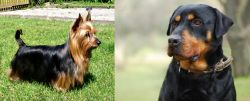 Australian Silky Terrier is originated from Australia but Rottweiler is originated from Germany. Australian Silky Terrier may grow 43 cm / 16 inches shorter than Rottweiler. Australian Silky Terrier may weigh 54 kg / 119 pounds lesser than Rottweiler. Australian Silky Terrier may live 4 years more than Rottweiler. Australian Silky Terrier may have less litter size than Rottweiler. Australian Silky Terrier requires Moderate maintenance. But Rottweiler requires Low maintenance
Australian Silky Terrier is originated from Australia but Rottweiler is originated from Germany. Australian Silky Terrier may grow 43 cm / 16 inches shorter than Rottweiler. Australian Silky Terrier may weigh 54 kg / 119 pounds lesser than Rottweiler. Australian Silky Terrier may live 4 years more than Rottweiler. Australian Silky Terrier may have less litter size than Rottweiler. Australian Silky Terrier requires Moderate maintenance. But Rottweiler requires Low maintenance
 Many toy breeds have been bred for centuries and were kept as lap dogs and companion dogs. Known at first as ‘The Sydney Silk’ the Australian Silky Terrier originated in Australia, but before the 2nd World War, the Australian SilkyTerrier was all but unknown outside Australia.
Many toy breeds have been bred for centuries and were kept as lap dogs and companion dogs. Known at first as ‘The Sydney Silk’ the Australian Silky Terrier originated in Australia, but before the 2nd World War, the Australian SilkyTerrier was all but unknown outside Australia.
The toy breed came about by crossing the Yorkshire Terrier and the Australian Terrier, but further crossings contributed to the silky coat and the small size we are familiar with today. Despite this little dog being classified in the Toy Group, this spunky dog has the ability to hunt and kill rodents.
Victorian and Tasmanian breeders claimed to be originators of the breed, so the official name, Australian Silky Terrier, was adopted in 1956. Since recognition by the American Kennel Club in 1955, the breed has enjoyed a solid build up of fans.
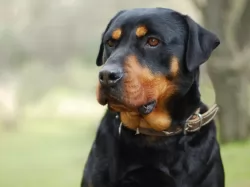 It is beleived to be the Rottweiler has been developed from the Roman cattle dogs. The Roman empire made a camp in a place at Germany in 74 AD. The area was called as 'das Rote Wil' and later as 'Rottweil'. In the middle ages Rottweiler was used in bear hunting and as a cattle dog. In 1899 the International club for Leonbergers and Rottweiler dogs was formed in Germany. In 19th century due to set in of railways the cattle was moved by railways and the need for the breed declined. When the world war was set in there came a heavy demand for police dogs. Rottweilers played a major role in first and second world war.
It is beleived to be the Rottweiler has been developed from the Roman cattle dogs. The Roman empire made a camp in a place at Germany in 74 AD. The area was called as 'das Rote Wil' and later as 'Rottweil'. In the middle ages Rottweiler was used in bear hunting and as a cattle dog. In 1899 the International club for Leonbergers and Rottweiler dogs was formed in Germany. In 19th century due to set in of railways the cattle was moved by railways and the need for the breed declined. When the world war was set in there came a heavy demand for police dogs. Rottweilers played a major role in first and second world war.
In 1921 many German Rottweiler clubs joined together to form ADRK, which is Allgemeiner Deutscher Rottweiler Klub. This is said to be the home club of Rottweiler. American kennel club recognised them in 1931. They become 9th most popular breed in America in 2013.
 This is a small breed with Loads of Spunk. The Silky terrier is somewhat longer than tall and height is around 23cm, with weight being about 4kg. He has an athletic build and although the bone structure is refined, the small dog has amazing strength and durability with a keen, alert face. Small but sturdily built, the dark, almond-shaped eyes don’t miss a thing as do the small, erect v-shaped ears.
This is a small breed with Loads of Spunk. The Silky terrier is somewhat longer than tall and height is around 23cm, with weight being about 4kg. He has an athletic build and although the bone structure is refined, the small dog has amazing strength and durability with a keen, alert face. Small but sturdily built, the dark, almond-shaped eyes don’t miss a thing as do the small, erect v-shaped ears.
Full of fun and packed with character, the Silky Terrier isn’t your regular lap dog as he is bold, active, feisty and playful- always ready for action. He can be aggressive toward strange pets but becomes amicable with other pets in the home. He is sharp and clever, and can be trained to be an absolute pleasure in the home and a playmate for children trained to be kind to animals.
They are loving and devoted to their human family and can be excellent watchdogs even though they can’t offer much protection.
Of course, the Silky Terrier gets his name from the sleek, silky coat that if allowed to grow, flows down from their backs to the floor. It is the dogs most distinctive feature. They come in several solid colors and mixes of colors too such as blue/tan, grey/blue and cream.
The Silky is an adaptable dog and even though he is energetic and will needs daily physical and mental exercise, he can be a country or an apartment dog, but will require plenty of exercise and getting out and about.
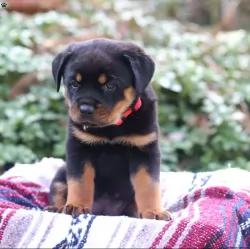 Rottweilers are good natured, obedient and are very much eager to work. They are calm, confident and an excellent watchdog. They will not make friends immediately. Rottweilers can be said as an all purpose dog since they are suitable as companion and watch dog as well. He is good in herding and guarding as genital feature. Rottweiler must be trained from its younger stage and should not be hit while training. They have high energy level and thus they are interested in doing work if properly trained. There are more possibilities of biting the strangers because of watchdog tendency.
Rottweilers are good natured, obedient and are very much eager to work. They are calm, confident and an excellent watchdog. They will not make friends immediately. Rottweilers can be said as an all purpose dog since they are suitable as companion and watch dog as well. He is good in herding and guarding as genital feature. Rottweiler must be trained from its younger stage and should not be hit while training. They have high energy level and thus they are interested in doing work if properly trained. There are more possibilities of biting the strangers because of watchdog tendency.
They are very good in herding sheeps as they have a natural gathering style. They are clever and adjusts the barking sound according to the situation. While herding they used to prove the leadership by selecting the dominant one in the flock and challenging it. If they were made to watch a same flock of cattle regularly, then they will develop a bond with them and will be affectionate with them as long as the cattle obeys its commands.
 Small in stature but with a strong personality, the Australian Silky Terrier is a keen, intelligent, active, energetic and spunky breed. He is affectionate and loyal towards his human family, and although good with older children and other pets, he may not get on too well with small children and their erratic movements.
Small in stature but with a strong personality, the Australian Silky Terrier is a keen, intelligent, active, energetic and spunky breed. He is affectionate and loyal towards his human family, and although good with older children and other pets, he may not get on too well with small children and their erratic movements.
Don’t leave him alone for too long as he becomes anxious and destructive. He is an active dog too and while he will adapt to apartment living, he will need exercise and games to keep him active, fit, stimulated and healthy. Your Silky is an intelligent dog but he is stubborn too and proper socialization and training will be important for Silky Terriers, as then he becomes quite sociable.
A firm but gentle hand will be needed to train this wilful little dog, but when you show him who’s boss, he becomes your devoted and loyal friend.
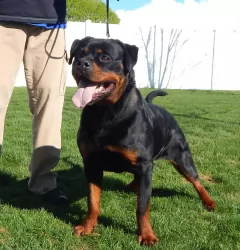 They are friendly with children and enjoy the company with them. But it is not advised to leave them with children without adult supervision.
They are friendly with children and enjoy the company with them. But it is not advised to leave them with children without adult supervision.
Rottweilers do not make friends immediately but take time to know about new people. He is an excellent watchdog. Males are quiet in nature but are watchful and females are more affectionate and obey some more. A good training is required for them to obey your orders.
They are not good for apartment life and thus a fenced back yard will be better for them to play and spend the energy. They require companion and will be happy to walk around with you. Hot weather will be some what better for them when compared with cold.
Rottweilers are easy to train because of their high intelligence. The training should be started in their young stage to have best results. They should not be dominated but treated kindly with understanding. They should be comfortable with the surroundings and people. Giving him a reward for training will make him interested in doing it. If he does a mistake then he should not be hit, so that he may get fear and loss his interest in doing it. Punishments will never work for them but rewarding will make him encouraged. Simple commands such as sit and stand shall be taught to them.
 The Australian Silky Terrier is generally healthy and he has a lifespan of 11 – 14 years. However he may suffer from some problems such as Legg-Perthes disease. This means degeneration of the head on the femur bone of the dog's hind leg, resulting is osteoarthritis. This ailment is commonly seen in miniature-, small and toy breeds and can result in lameness and pain.
The Australian Silky Terrier is generally healthy and he has a lifespan of 11 – 14 years. However he may suffer from some problems such as Legg-Perthes disease. This means degeneration of the head on the femur bone of the dog's hind leg, resulting is osteoarthritis. This ailment is commonly seen in miniature-, small and toy breeds and can result in lameness and pain.
Silky Terriers are also prone to certain eye disorders, including PRA or Progressive Retinal Atrophy as well as cataracts. PRA can lead to total blindness.
Getting the right puppy shots and vaccinations is also part of good health care for your Silky and you can speak to your vet about what injections are due at 6 – 8 weeks of age and what booster vaccinations may be necessary.
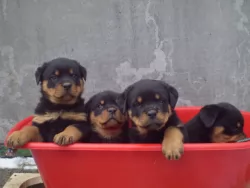 The health issues affecting the eyes of them are Cataract and Progressive Retinal Atropy. Health problems common in their joints are Hip Dysplasia, Elbow Dysplasia and Panosteitis. They also have chances to get circulatory system problems like Aortic Stenosis and Von Willebrand's Disease. Other common health problems in Rottweiler are Bloat and Cancer.
The health issues affecting the eyes of them are Cataract and Progressive Retinal Atropy. Health problems common in their joints are Hip Dysplasia, Elbow Dysplasia and Panosteitis. They also have chances to get circulatory system problems like Aortic Stenosis and Von Willebrand's Disease. Other common health problems in Rottweiler are Bloat and Cancer.
Mostly people think that Rottweilers don't shed but they are short haired dog and sheds more. They are having double coat that is undercoat and topcoat. The undercoat is softer and protects them in winter and topcoat is rougher and visible. It is said that they will shed in spring and winter seasons. Shedding can be reduced by brushing them.
 The long, straight coat of the Silky will need a fair amount of brushing each day. This dog is considered a hypoallergenic breed, and although he doesn’t shed a lot, the length of the hair will require regular brushing to get rid of loose hairs but also ensure there is no tangling of the hair. If the hair of the dog is kept long, he may require a bath every now and then to keep his hair silky and clean and to get rid of dirt build-up.
The long, straight coat of the Silky will need a fair amount of brushing each day. This dog is considered a hypoallergenic breed, and although he doesn’t shed a lot, the length of the hair will require regular brushing to get rid of loose hairs but also ensure there is no tangling of the hair. If the hair of the dog is kept long, he may require a bath every now and then to keep his hair silky and clean and to get rid of dirt build-up.
A healthy, nutritional diet is important for keeping your canine friend healthy and free from disease and unhealthy skin. To stay health your pet will require correct amounts of vitamins and minerals.
Dog food companies make different types of dog food such as dry, semi-moist, and moist and these are available for dogs of different ages, activity levels and stage of life. Speak to your vet about selecting a dog food that is right for your Australian Silky Terrier and always ensure a bowl of fresh water is available to him.
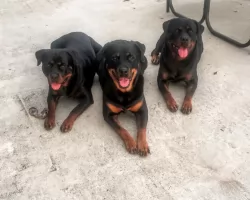 Rottweiler puppies should be given a diet which has protein, carbohydrates and fats. They need different diets in their growing stages. They can be given chicken with bones and vegetables for 4 days in a week. Beef with vegetables can also be given. When feeding them red meat a raw meaty bone can also be included. Fish oil can be given such that starting with 1000 mg and making it to 3000 mg in a time of two weeks.
Rottweiler puppies should be given a diet which has protein, carbohydrates and fats. They need different diets in their growing stages. They can be given chicken with bones and vegetables for 4 days in a week. Beef with vegetables can also be given. When feeding them red meat a raw meaty bone can also be included. Fish oil can be given such that starting with 1000 mg and making it to 3000 mg in a time of two weeks.
High calories of protein should be provided to them to meet their energy requirements. While buying commercial food it should be checked for the main ingredient to be meat. Protein levels should be more from animals than vegetables. High quality dairy products should be included. Food should not have low quality flavours and preservatives. Healthy fat is necessary for their skin and coat. If these fats are not provided it will cause dandruff and itchy skin.
Brushing them weekly once is recommended for their coat and skin. Buying the puppy from reputable breeder will be better. Vaccinations and preventive medicines should be given on right time. Spaying and Neutering should be done to avoid unwanted pregnancy. High quality diet should be maintained. Making them to bath once in a week is advisable. Nails should be trimmed once in every two weeks.
Rottweilers like to chase something and Laser pointer will be a good game for them. It will make them busy and also entertain us. But it should be on a limit and they should not get bored. A treat or toy can be hided and they can be made to find it. A bottle should be filled with water and frozen. The frozen bottle can be given to them for playing. In summer time it will make them very happy to play with it. A ball or toy can be thrown and they can be made to fetch it. Walking them is also a good exercise.